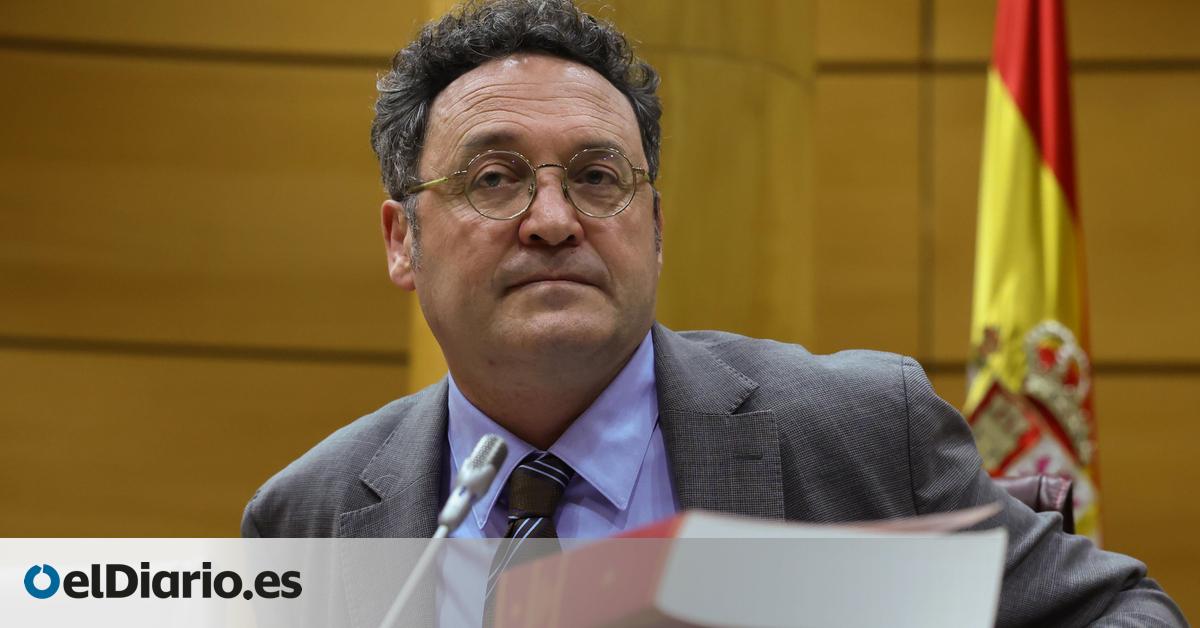
The State Attorney General has submitted a brief in which he asks the Supreme Court of his acquittal in the case of the filtration of the confession of Isabel Díaz Ayuso. A document in which Álvaro García Ortiz reviews almost a year of investigation to conclude that there is no evidence that links him to that publication: by the time he met that email, several people, especially journalists, had already had access to their content. If the Prosecutor’s Office compiled all the information about this cause of fiscal fraud, he adds, it was to counteract the “perfectly orchestrated operation” of the surroundings of the Madrid president and his chief of cabinet, Miguel Ángel Rodríguez, who put bulls in circulation to “divert the focus”.
The cause that started almost a year ago will be taken to trial before the Criminal Chamber at the end of November with the Attorney General on the bench accused of filtering the press an email in which Alberto González Amador’s lawyer recognized the fiscal fraud of his client and offered a pact to the Prosecutor’s Office. A confession that transcended the press on the night of March 13 while Isabel Díaz Ayuso, appearance after appearance, affirmed that the whole case was a state operation against her partner.
Judge Ángel Hurtado, after the Appeals Chamber limited his order of processing, opened an oral trial against the Attorney General, leaving a story in which García Ortiz leaked that mail to the press to harm the employer. Now the state’s advocacy counterattacks with a defense writing that draws a different story: that email was available to many more people, there is no proof that he filtered a single journalist and, by the time he had all the data on his table, that confession already circulated through some of the main writings of the country.
García Ortiz recounts how in the prosecution nobody knew that Isabel Díaz Ayuso had been denounced for defrauding 350,000 euros. And he explains that the mail of the lawyer Carlos Neira recognizing that “certainly” the businessman had committed two fiscal crimes was in the hands of many people since he was sent on February 2, 2024. He arrived at a generic account of the Prosecutor’s Office of Economic Crimes to which 16 people have access, in addition to being sent to a state lawyer, weeks before being denounced, looking for a silent exit to the case.
“Carlos Neira broke, unilaterally, any alleged confidentiality of the email,” says the attorney general. And that confidentiality, he adds, continued to break when Miguel Ángel Rodríguez, chief of Cabinet of Isabel Díaz Ayuso, was in contact with the businessman, got an email from the prosecutor of the case and spread it among the press along with a bullet to, says, “divert the focus of the information published by Eldiario.es and accuse the Prosecutor’s Office of persecuting the president of the president of the president of the community.”
The investigation has shown that on the morning of March 12, 2024, a few hours after this newspaper revealed that the Prosecutor’s Office had denounced Alberto González Amador for fiscal fraud, the businessman sent Miguel Ángel Rodríguez an email of the prosecutor Julián Salto that reflected the existence of those negotiations. “The hypothetical confidentiality of the conversations between lawyer and prosecutor to achieve compliance was broken,” says García Ortiz. Moreover, he continues, when on the afternoon of the next day the head of the Cabinet of the regional president spread one of those emails and a false version of the case among dozens of media: that the prosecution’s dome had truncated a possible agreement of conformity.
Miguel Ángel Rodríguez, explains the attorney general, “designed and executed a strategy consisting of building and disseminating an alternative story.” A “political persecution” against Ayuso executed between the Treasury and the Prosecutor’s Office. “Coordinated Actions” between the statements of Ayuso itself, which came to question the “honesty” of the provincial prosecutor of Madrid, and the leaks of Miguel Ángel Rodríguez. It was then, late in the afternoon of March 13, 2024, when the Attorney General and his collaborators began to collect all the information from some negotiations that, until then, did not know.
A “misinformation campaign” against the Prosecutor’s Office
The Prosecutor’s Office of the Attorney General reviews all the evidence and proceedings that Judge Hurtado has considered irrelevant in recent months. From the role that Miguel Ángel Ramírez played and the environment of González Amador to disseminate information with “radically false” elements of his case, to the journalists who have explained in the Supreme Court that these negotiations knew before the documents arrived at the hands of García Ortiz that night.
That night “the confusion spread first and then the concern” in the Prosecutor’s Office and García Ortiz, with the approval of his collaborators, he activated the mechanism of accounts so that prosecutor Julián Salto, who was in a football match, sent those emails to his superiors. The objective, he adds, was to issue a statement the next day to deal with that “misinformation campaign.” “That operational account of account for issues with possible public transcendence is the procedure that is usually followed,” he explains.
The Prosecutor’s Office compiled the information while journalists and media tried to do the same. Several publications falsely claimed that the Public Ministry had offered a pact to the employer, canceled by indications of the fiscal dome, when reality was the opposite. “A great informative interest was raised that promoted all media to intense research activity, the result of which some of them managed to obtain from their sources and publish the mail,” explains García Ortiz. But he continues in the brief, he did not talk to any journalist or leaked that email.
Several journalists declared having access to that email before, some in hours very similar to the Attorney General. That, alleges the state’s advocacy, does not imply that he was the origin of the filtration. “If both facts are close in time, it is because the two had the same triggering cause, which was the implementation from the Madrid community of a series of coordinated communication actions” to protect González Amador before public opinion through a bully. “Obtaining the mail by some journalists and the knowledge of it by the Attorney General must be close in time.”
The statement that the Prosecutor published the next day, in which it did actively intervened, also does not constitute a crime of revelation of secrets according to the Attorney General. “All the data that were included in the note were certain and necessary to deny the imputations of irregular action and had already disseminated and were public knowledge.” All these steps, he adds, became “in the legitimate exercise of their powers” and, in addition, González Amador’s lawyers continued to negotiate “for months” a possible conformity. A González Amador who, as the Supreme Civil Chamber has said, was then a public character.
Source: www.eldiario.es

